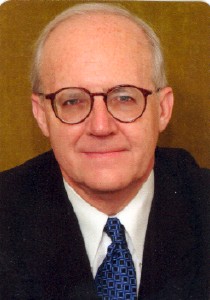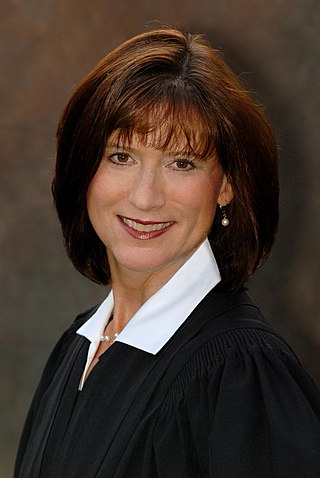Related Research Articles
Precedent is a principle or rule established in a legal case that becomes authoritative to a court or other tribunal when deciding subsequent cases with similar legal issues or facts. The legal doctrine stating that courts should follow precedent is called stare decisis.
Legal formalism is both a descriptive theory and a normative theory of how judges should decide cases. In its descriptive sense, formalists maintain that judges reach their decisions by applying uncontroversial principles to the facts; formalists believe that there is an underlying logic to the many legal principles that may be applied in different cases. These principles, they claim, are straightforward and can be readily discovered by anyone with some legal expertise. Supreme Court Justice Oliver Wendell Holmes Jr., by contrast, believed that "The life of the law has not been logic: it has been experience". The formalist era is generally viewed as having existed from the 1870s to the 1920s, but some scholars deny that legal formalism ever existed in practice.

Frank Hoover Easterbrook is an American lawyer and jurist who has served as a United States circuit judge of the U.S. Court of Appeals for the Seventh Circuit since 1985. He was the Seventh Circuit's chief judge from 2006 to 2013.

James Harvie Wilkinson III is an American jurist who serves as a United States circuit judge on the United States Court of Appeals for the Fourth Circuit. His name has been raised at several junctures in the past as a possible nominee to the United States Supreme Court.
Reva B. Siegel is the Nicholas deB. Katzenbach Professor of Law at Yale Law School. Siegel's writing draws on legal history to explore questions of law and inequality, and to analyze how courts interact with representative government and popular movements in interpreting the Constitution. She is currently writing on the role of social movement conflict in guiding constitutional change, addressing this question in recent articles on reproductive rights, originalism and the Second Amendment, the "de facto ERA," and the enforcement of Brown. Her publications include Processes of Constitutional Decisionmaking ; The Constitution in 2020 ; and Directions in Sexual Harassment Law. Professor Siegel received her B.A., M.Phil, and J.D. from Yale University, clerked for Judge Spottswood William Robinson III on the D.C. Circuit, and began teaching at the University of California at Berkeley. She is a member of the American Academy of Arts and Sciences, and is active in the American Society for Legal History, the Association of American Law Schools, the American Constitution Society, in the national organization and as faculty advisor of Yale's chapter. She was elected to the American Philosophical Society in 2018.
Michael William McConnell is an American jurist who served as a United States circuit judge of the United States Court of Appeals for the Tenth Circuit from 2002 to 2009. Since 2009, McConnell has been a professor and Director of the Stanford Constitutional Law Center at Stanford Law School. He is also a senior fellow at Stanford University's Hoover Institution, and Senior Of Counsel to the Litigation Practice Group at Wilson Sonsini Goodrich & Rosati. In May 2020, Facebook appointed him to its content oversight board. In 2020, McConnell published The President Who Would Not Be King: Executive Power under the Constitution under Princeton University Press.

Danny Julian Boggs is an American attorney and a senior United States circuit judge of the United States Court of Appeals for the Sixth Circuit. He was appointed to the court in 1986 and served as its chief judge from September 2003 to August 2009. Boggs was on the short list of President George W. Bush's candidates for the U.S. Supreme Court.

Diane Schwerm Sykes is an American jurist and lawyer who serves as the chief judge of the U.S. Court of Appeals for the Seventh Circuit. She served as a justice of the Wisconsin Supreme Court from 1999 to 2004.

Mari J. Matsuda is an American lawyer, activist, and law professor at the William S. Richardson School of Law at the University of Hawaiʻi at Mānoa. She was the first tenured female Asian American law professor in the United States, at University of California, Los Angeles (UCLA) School of Law in 1998 and one of the leading voices in critical race theory since its inception. Matsuda returned to Richardson in the fall of 2008. Prior to her return, Matsuda was a professor at the UCLA School of Law and Georgetown University Law Center, specializing in the fields of torts, constitutional law, legal history, feminist theory, critical race theory, and civil rights law.

Eric Andrew Posner is an American lawyer and legal scholar. As a law professor at the University of Chicago Law School, Posner has taught international law, contract law, and bankruptcy, among other areas. He is the son of retired Seventh Circuit Judge Richard Posner.

Diane Pamela Wood is an American attorney who serves as the director of the American Law Institute, a senior circuit judge of the United States Court of Appeals for the Seventh Circuit, and a senior lecturer at the University of Chicago Law School.
Non-publication of legal opinions is the practice of a court issuing unpublished opinions. An unpublished opinion is a decision of a court that is not available for citation as precedent because the court deems the case to have insufficient precedential value.

Thomas Lee Ambro is a Senior United States circuit judge of the United States Court of Appeals for the Third Circuit.
Patrick R. Hugg is an American legal scholar and professor. He joined the Loyola University in 1986, after practising in labor and employment discrimination law in New Orleans, Louisiana. He holds the John J. McAulay Distinguished Professorship.
J. Michael Eakin is an American lawyer, who served as a Justice of the Supreme Court of the Commonwealth of Pennsylvania. He was elected to the State's Supreme Court in 2001 as a Republican. In November 2011, Justice Eakin won judicial retention in a statewide election for his second 10-year term with 73.6% of the popular vote. In response to an ethics investigation, he made his resignation public on March 15, 2016.
A judicial opinion is a form of legal opinion written by a judge or a judicial panel in the course of resolving a legal dispute, providing the decision reached to resolve the dispute, and usually indicating the facts which led to the dispute and an analysis of the law used to arrive at the decision.

Harry Thomas Edwards is an American jurist. He served as a United States circuit judge of the United States Court of Appeals for the District of Columbia Circuit from 1980 to 2005, taking senior status in 2005, and a professor of law at the New York University School of Law.

Richard Allen Posner is an American legal scholar who served as a federal appellate judge on the U.S. Court of Appeals for the Seventh Circuit from 1981 to 2017. A senior lecturer at the University of Chicago Law School, Posner was identified by The Journal of Legal Studies as the most-cited legal scholar of the 20th century. As of 2021, he is also the most-cited legal scholar of all time. He is widely considered to be one of the most influential legal scholars in the United States.

William Nichol Eskridge Jr. is an American legal scholar who is the John A. Garver Professor of Jurisprudence at Yale Law School. He is one of the most cited law professors in America, ranking fourth overall for the period 2016–2020. He writes primarily on constitutional law, legislation and statutory interpretation, religion, marriage equality, and LGBT rights.

In United States constitutional law, the penumbra includes a group of rights derived, by implication, from other rights explicitly protected in the Bill of Rights. These rights have been identified through a process of "reasoning-by-interpolation", where specific principles are recognized from "general idea[s]" that are explicitly expressed in other constitutional provisions. Although researchers have traced the origin of the term to the nineteenth century, the term first gained significant popular attention in 1965, when Justice William O. Douglas's majority opinion in Griswold v. Connecticut identified a right to privacy in the penumbra of the constitution.
References
Citations
- ↑ Fisher v. Lowe,333N.W.2d67(Mich. Ct. App.1983)
- ↑ Kearney, 12 Widener L.J. at 599
- ↑ White, 82 Michigan L.J. at 1672
- ↑ White, 82 Michigan L.J. at 1672–1673
- ↑ Kearney, 12 Widener L.J. at 600
- ↑ Kearney, 12 Widener L.J. at 603
- ↑ Kearney, 12 Widener L.J. at 603–604; Eberle & Grossfeld, 11 Roger Williams U. L. Rev. at 386
- ↑ Smith, 43 Arkansas L. Rev. at 12; Brown v. State,134Ga. App.771(Chatham Super. Ct.1975)
- ↑ Kearney, 12 Widener L.J. at 604
- ↑ Kearney, 12 Widener L.J. at 605
- ↑ Eberle & Grossfeld, 11 Roger Williams U. L. Rev. at 386
- ↑ Kearney, 12 Widener L.J. at 607
- ↑ Kearney, 12 Widener L.J. at 607–608; Smith, 43 Arkansas L. Rev. at 13
- ↑ Jordan, 41 U. Miami L. Rev. at 703
- ↑ Kearney, 12 Widener L.J. at 608
- ↑ Posner, 62 U. Chicago L. Rev. at 1423
- 1 2 White, 82 Michigan L.J. at 1675
- 1 2 Eberle & Grossfeld, 11 Roger Williams U. L. Rev. at 384
Bibliography
- Edward J. Eberle & Bernhard Grossfeld, Law and Poetry, 11 Roger Williams U. L. Rev. 353 (2006)
- Adalberto Jordan, Imagery, Humor, and the Judicial Opinion, 41 U. Miami L. Rev. 693 (1987)
- Mary Kate Kearney, The Propriety of Poetry in Judicial Opinions, 12 Widener L.J. 597 (2003)
- Richard Posner, Judges' Writing Styles (And Do They Matter?), 62 U. Chicago L. Rev. 1420 (1995)
- George Rose Smith, A Critique of Judicial Humor, 43 Arkansas L. Rev. 1 (1990)
- James Boyd White, The Judicial Opinion and the Poem: Ways of Reading, Ways of Life, 82 Michigan L.J. 1669 (1984)